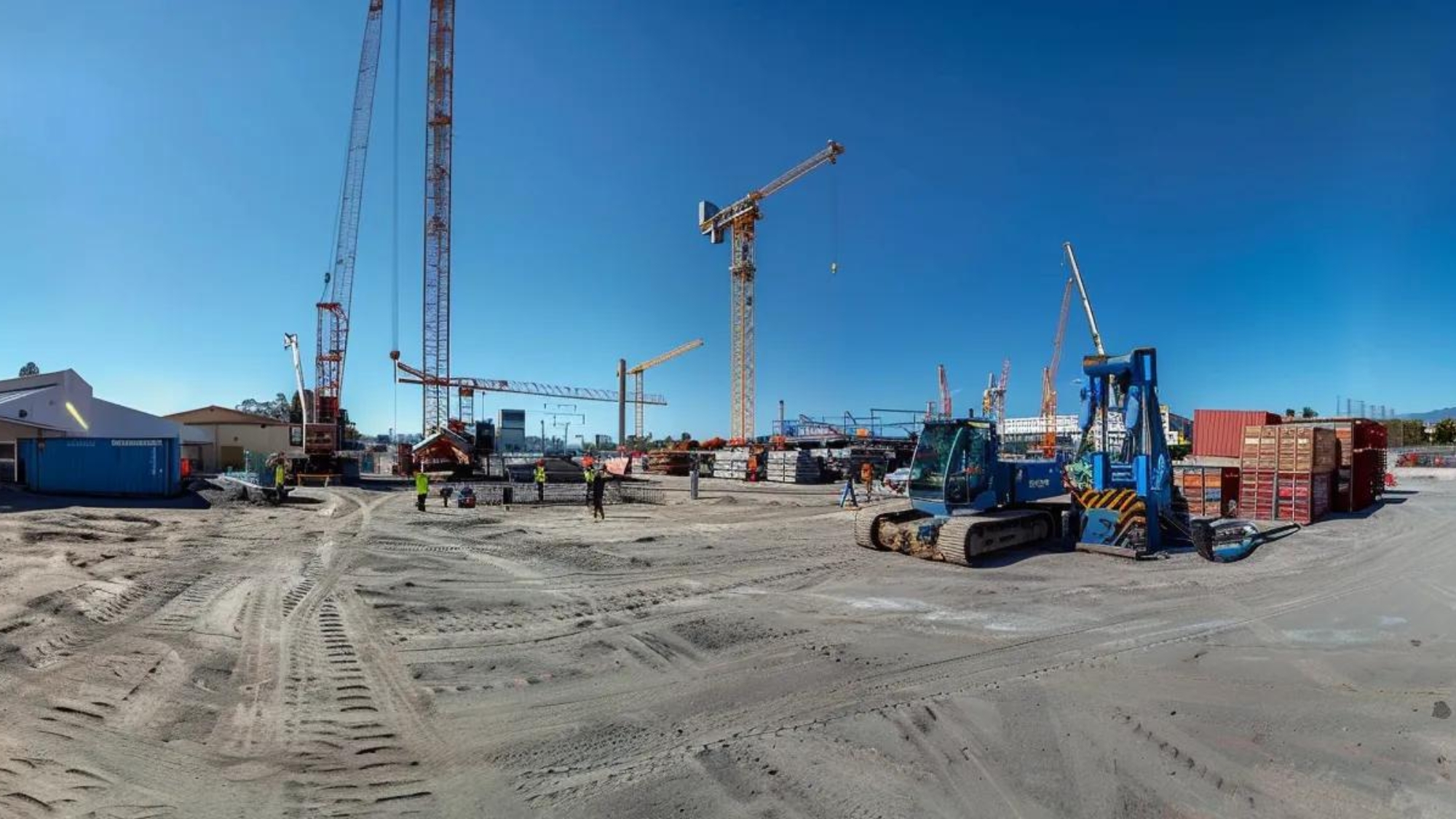In the competitive landscape of the construction industry, many businesses struggle to stand out online. A recent study shows that 75% of users never scroll past the first page of search results, highlighting the need for effective SEO strategies. This article will explore advanced techniques tailored for construction marketing consultants, including keyword optimization, website design, and backlink building. By implementing these strategies, businesses can enhance brand awareness and drive more traffic to their sites. Addressing common pain points, this guide will help construction companies improve their online visibility and attract more clients.
Key Takeaways
- SEO is essential for construction companies to enhance online visibility and attract clients
- Utilizing long-tail and localized keywords improves search engine rankings and regional reach
- Optimizing website architecture enhances crawlability and user experience, driving more traffic
- Engaging content, such as blogs and videos, establishes authority and fosters client trust
- Regularly analyzing SEO metrics helps refine strategies and improve overall performance
Understanding the Importance of SEO in the Construction Industry

The construction industry is experiencing a significant shift in marketing strategies, as traditional methods no longer meet the demands of modern clients. SEO plays a crucial role in this transformation, enhancing credibility and improving visibility across mobile devices. This section will explore keyword research, the importance of conversion rate optimization, and how these elements connect businesses with potential clients effectively.
The Changing Landscape of Construction Marketing
The construction marketing landscape is evolving rapidly, driven by the need for businesses to adapt to digital trends. As clients increasingly rely on online platforms to find services, a strong presence in organic search results becomes essential. Construction companies must prioritize SEO strategies with construction marketing consultants, including optimizing metadata and understanding algorithm changes, to enhance visibility and compete effectively against traditional online advertising methods.
Why Traditional Methods No Longer Suffice
Traditional marketing methods, such as print advertising and word-of-mouth referrals, are becoming less effective in the construction industry due to the shift towards digital platforms. Clients now prioritize user experience and seek information online, making it essential for construction companies to invest in construction SEO strategies that enhance their web pagevisibility. By conducting thorough competitor analysis, businesses can identify gaps in their online presence and implement targeted tactics to attract potential clients more effectively.
How SEO Connects You With Modern Clients
SEO serves as a vital resource for construction companies aiming to connect with modern clients. By implementing effective strategies, such as utilizing clean URLs and optimizing content for search engines, businesses can significantly enhance their online visibility. This increased visibility not only attracts potential clients but also improves the return on investment by driving targeted traffic to their websites, ultimately leading to higher conversion rates and business growth.
SEO is the foundation that can elevate a construction business. Now, it is time to explore advanced keyword strategies that can drive even more traffic to your site.
Advanced Keyword Strategies for Construction Businesses

Identifying high-value industry keywords is essential for construction businesses aiming to improve their search engine results page rankings. Utilizing long-tail keywords can effectively target niche services, while incorporating localized keywords enhances regional reach. Analyzing competitor keywords provides strategic advantages, fostering customer engagement and building brandconfidence. Each of these strategies plays a critical role in maximizing visibility and driving growth.
Identifying High-Value Industry Keywords
Identifying high-value industry keywords is essential for construction businesses seeking to enhance their online presence. By focusing on terms that potential customers frequently search for, companies can improve navigation to their websites and increase engagement. For instance, using keywords related to specific services, such as “commercial constructionexpert” or “residential renovation,” can drive targeted traffic to landing pages, ultimately leading to higher conversion rates. Additionally, integrating these keywords into email marketing campaigns can further connect with clients, ensuring that the right audience receives relevant information tailored to their needs.
Utilizing Long-Tail Keywords for Niche Services
Utilizing long-tail keywords is essential for construction businesses aiming to align with user intent and enhance lead generation. By focusing on specific phrases that potential clients are likely to search for, such as “eco-friendly home renovation” or “commercial building design innovation,” companies can attract a more targeted audience. This approach not only improves search engine rankings but also supports responsive web design, ensuring that the content meets the needs of users across various devices, ultimately leading to increased engagement and conversion rates.
Incorporating Localized Keywords for Regional Reach
Incorporating localized keywords is a vital strategy for construction businesses aiming to enhance their visibility in specific regions. By focusing on terms that reflect local services, such as “construction services in [City Name]” or “home renovation [City Name],” companies can effectively connect with users searching for nearby options. Additionally, optimizing Google Business profiles and ensuring accurate citations across various platforms can significantly improve local search rankings, making it easier for potential clients to find and engage with the business.
- Identify relevant localized keywords that reflect specific services.
- Optimize Google Business profiles for better local visibility.
- Ensure accurate citations across online directories.
- Utilize link building strategies to enhance local authority.
Analyzing Competitor Keywords for Strategic Advantage
Analyzing competitor keywords is a strategic approach that construction businesses can leverage to enhance their online presence. By examining the keywords that successful general contractors use, companies can identify gaps in their own content marketing efforts and adjust their copywriting strategies accordingly. This analysis not only helps in understanding the relevance of specific terms but also informs social media campaigns, ensuring that the content resonates with the target audience and drives engagement.
With the right keywords, a construction business can stand out. Next, it is time to turn that visibility into action by optimizing your website for search engines.
Optimizing Your Construction Website for Search Engines

Optimizing a construction website for search engines involves several key strategies that enhance visibility and drive revenue. Enhancing site architecture improves crawlability, while implementing schema markup can lead to rich results in search engine marketing. Additionally, improving page load speed and ensuring mobile responsiveness are crucial for user experience. Each of these elements contributes to effective search engine optimization and supports long-tail keyword strategies.
Enhancing Site Architecture for Better Crawlability
Enhancing site architecture is essential for improving crawlability, which directly impacts a construction company’s visibility in local search results. A well-structured website allows search engines to navigate and index content efficiently, ensuring that relevant pages are easily accessible. By implementing clear navigation menus, optimizing internal linking, and regularly evaluating content creation strategies, construction businesses can significantly enhance their online presence and attract more potential clients through their Google Business Profile.
| Site Architecture Elements | Impact on Crawlability | Best Practices |
|---|---|---|
| Clear Navigation Menus | Facilitates easy access for search engines | Use descriptive labels for categories |
| Optimized Internal Linking | Improves page authority and indexing | Link relevant pages to each other |
| Regular Content Evaluation | Ensures up-to-date and relevant information | Review and refresh content periodically |
Implementing Schema Markup for Rich Results
Implementing schema markup is a powerful marketing strategy for construction companies aiming to enhance their online visibility. By using XML structured data, businesses can provide search engines with detailed information about their services, which can lead to rich results in search listings. This not only improves the chances of attracting the target market but also allows for better analytics on user engagement, ultimately supporting broader social media marketing efforts and driving more qualified traffic to their websites.
Improving Page Load Speed for User Experience
Improving page load speed is a critical factor for enhancing user experience on construction websites. A slow-loading site can lead to high bounce rates, negatively impacting both user engagement and search engine rankings. By partnering with a reputable SEO company, construction businesses can implement effective web development practices, such as optimizing images and leveraging browser caching, to ensure faster load times. This not only boosts user satisfaction but also strengthens the company’s online reputation management efforts, as clients are more likely to return to a site that performs well.
| Optimization Techniques | Impact on Page Load Speed | Best Practices |
|---|---|---|
| Image Optimization | Reduces file size for quicker loading | Use compressed formats like JPEG or PNG |
| Browser Caching | Stores frequently accessed data for faster retrieval | Set expiration dates for static resources |
| Minifying CSS and JavaScript | Decreases file size and improves load time | Remove unnecessary characters and comments |
Ensuring Mobile Responsiveness Across Devices
Ensuring mobile responsiveness across devices is essential for construction companies aiming to connect with their target audience effectively. A well-optimized website that adapts seamlessly to various screen sizes not only enhances user experience but also positively impacts the company’s online reputation. Utilizing a robust content management system can facilitate the implementation of responsive design, allowing businesses to present their services clearly and attractively, regardless of the device used by potential clients.
| Responsive Design Elements | Impact on User Experience | Best Practices |
|---|---|---|
| Fluid Grids | Ensures content scales appropriately on all devices | Use percentage-based widths for layout |
| Flexible Images | Prevents images from exceeding screen size | Set max-width to 100% |
| Media Queries | Allows for different styles based on device characteristics | Implement breakpoints for various screen sizes |
A well-optimized website attracts visitors, but it is the content that keeps them coming back. Creating valuable content not only informs but also engages, turning casual readers into loyal clients.
Creating Valuable Content That Drives Engagement

Developing industry-specific blogs and articles is essential for construction companies to establish authority and engage their audience. Showcasing projects through case studies provides real-world examples that resonate with potential clients. Utilizing video content for demonstrations enhances understanding, while engaging audiences with infographics and visual data simplifies complex information. Each of these strategies plays a vital role in maximizing visibility and driving engagement.
Developing Industry-Specific Blogs and Articles
Developing industry-specific blogs and articles is a fundamental strategy for construction companies aiming to enhance their online presence and engage potential clients. By focusing on relevant topics such as sustainable building practices or innovative construction technologies, businesses can position themselves as thought leaders in the field. This not only attracts targeted traffic but also addresses the specific needs and pain points of clients, ultimately fostering trust and encouraging conversions.
| Content Type | Purpose | Benefits |
|---|---|---|
| Industry-Specific Blogs | Educate clients on relevant topics | Establish authority and drive traffic |
| Case Studies | Showcase successful projects | Build credibility and trust |
| Video Content | Demonstrate services visually | Enhance understanding and engagement |
Showcasing Projects Through Case Studies
Showcasing projects through case studies is an effective strategy for construction companies to demonstrate their expertise and build credibility. By detailing successful projects, including challenges faced and solutions implemented, businesses can provide potential clients with tangible evidence of their capabilities. This not only enhances engagement but also improves search enginevisibility, as well-crafted case studies often rank well for relevant keywords, attracting targeted traffic to the company’s website.
- Identify key projects that highlight unique skills and services.
- Detail the challenges faced and the solutions provided.
- Include visuals and metrics to enhance the narrative.
- Promote case studies through social media and email marketing.
Utilizing Video Content for Demonstrations
Utilizing video content for demonstrations is an effective strategy for construction companies to showcase their services and engage potential clients. By creating informative videos that highlight project processes, techniques, and results, businesses can provide a clear visual representation of their expertise. This not only enhances user understanding but also improves search engine rankings, as video content is increasingly favored by algorithms, driving more traffic to the company’s website.
| Video Content Type | Purpose | Benefits |
|---|---|---|
| Project Walkthroughs | Showcase construction processes | Enhances transparency and trust |
| Client Testimonials | Highlight customer satisfaction | Builds credibility and attracts leads |
| How-To Guides | Educate clients on services | Positions company as an industry expert |
Engaging Audiences With Infographics and Visual Data
Engaging audiences with infographics and visual data is a powerful strategy for construction companies looking to enhance their online presence. Infographics simplify complex information, making it easier for potential clients to understand key concepts related to construction processes, project timelines, and industry trends. By incorporating visually appealing graphics into their content marketing efforts, businesses can capture attention, increase shareability on social media, and ultimately drive more traffic to their websites.
- Infographics simplify complex construction information.
- Visual data enhances understanding of key concepts.
- Engaging graphics increase shareability on social media.
- Effective use of visuals drives traffic to websites.
Creating great content is just the beginning. To truly stand out, one must also master the art of off-page SEO techniques that build authority and trust.
Building Authority With Off-Page SEO Techniques

Building authority through off-page SEO techniques is essential for construction companies aiming to maximize visibility. Earning quality backlinks from industry publications enhances credibility, while leveraging social media platforms boosts brand awareness. Networking with industry influencers and partners fosters valuable connections, and participating in online forums and communities allows businesses to engage directly with potential clients. Each of these strategies plays a critical role in establishing a strong online presence.
Earning Quality Backlinks From Industry Publications
Earning quality backlinks from industry publications is a vital strategy for construction companies looking to enhance their online authority and visibility. By contributing expert articles or insights to reputable construction magazines and websites, businesses can not only gain valuable backlinks but also position themselves as thought leaders in the industry. This approach not only drives referral traffic but also improves search engine rankings, as search engines recognize the credibility associated with links from established publications.
Leveraging Social Media Platforms for Brand Awareness
Leveraging social media platforms is a powerful strategy for construction companies aiming to enhance brand awareness and authority. By sharing project updates, industry insights, and engaging content, businesses can connect with a broader audience and foster community engagement. For instance, showcasing completed projects on platforms like Instagram or LinkedIn not only highlights expertise but also encourages potential clients to interact, thereby increasing visibility and driving traffic to the company’s website.
Networking With Industry Influencers and Partners
Networking with industry influencers and partners is a strategic approach for construction companies seeking to enhance their authority and visibility online. By establishing relationships with key figures in the construction sector, businesses can gain access to valuable insights, collaborative opportunities, and increased exposure through shared content. For example, participating in industry events or webinars allows companies to showcase their expertise while building connections that can lead to quality backlinks and referrals, ultimately improving their search engine rankings.
| Networking Strategy | Benefits | Best Practices |
|---|---|---|
| Attend Industry Events | Build relationships and gain insights | Engage actively and follow up |
| Collaborate on Content | Increase exposure and credibility | Share valuable insights and resources |
| Leverage Social Media | Connect with influencers and partners | Share relevant content and engage |
Participating in Online Forums and Communities
Participating in online forums and communities is a strategic approach for construction companies to enhance their authority and visibility. By engaging in discussions on platforms such as Reddit, Quora, or industry-specific forums, businesses can share their expertise, answer questions, and provide valuable insights related to construction topics. This not only positions them as knowledgeable resources but also helps in building relationships with potential clients and industry peers, ultimately driving traffic to their websites.
| Forum Participation Strategy | Benefits | Best Practices |
|---|---|---|
| Engage in Relevant Discussions | Establish authority and trust | Provide thoughtful, informative responses |
| Share Industry Insights | Attract potential clients | Stay updated on industry trends |
| Network with Peers | Build valuable connections | Follow up and maintain relationships |
Building authority is just the beginning. Next, it is time to measure the impact of those efforts and understand what truly drives success.
Measuring and Analyzing SEO Performance

Effective measurement and analysis of SEO performance are crucial for construction companies aiming to maximize visibility. This section will cover setting up effective tracking tools to monitor website performance, interpreting key SEO metrics to gauge success, and adjusting strategies based on data insights. Additionally, staying updated with algorithm changes ensures that businesses remain competitive in the digital landscape.
Setting Up Effective Tracking Tools
Setting up effective tracking tools is essential for construction companies aiming to measure their SEO performance accurately. Utilizing platforms like Google Analytics and Google Search Console allows businesses to monitor website traffic, user behavior, and keyword rankings. By analyzing this data, companies can identify which SEO strategies are driving results and make informed adjustments to enhance their online visibility and connect with potential clients more effectively.
Interpreting Key SEO Metrics
Interpreting key SEO metrics is essential for construction companies seeking to enhance their online visibility. Metrics such as organic traffic, bounce rate, and conversion rate provide valuable insights into how well a website is performing in search engine results. For instance, a high bounce rate may indicate that visitors are not finding relevant information, prompting the need for content optimization to better align with user intent.
- Monitor organic traffic to assess overall visibility.
- Analyze bounce rate to identify content relevance issues.
- Evaluate conversion rates to measure the effectiveness of SEO strategies.
Adjusting Strategies Based on Data Insights
Adjusting strategies based on data insights is essential for construction companies aiming to enhance their SEO performance. By regularly analyzing metrics such as organic traffic and conversion rates, businesses can identify which tactics are effective and which require modification. For instance, if a specific keyword is driving significant traffic but has a low conversion rate, it may indicate a need for content refinement to better align with user intent, ultimately improving both visibility and client engagement.
Staying Updated With Algorithm Changes
Staying updated with algorithm changes is essential for construction companies aiming to maintain and enhance their online visibility. Search engines frequently adjust their algorithms, impacting how websites rank in search results. By following industry news, subscribing to SEO blogs, and participating in relevant forums, construction businesses can adapt their strategies to align with the latest best practices, ensuring they remain competitive and effectively connect with potential clients.
Key Takeaways for Effective Construction Marketing Strategies
Maximizing visibility through advanced SEO strategies is essential for construction companies to thrive in a digital-first marketplace. By focusing on effective keyword research, optimizing website architecture, and creating valuable content, businesses can significantly enhance their online presence and connect with potential clients. Implementing these strategies not only drives targeted traffic but also improves conversion rates, ultimately leading to business growth. Embracing SEO as a core component of marketing will empower construction firms to stay competitive and relevant in an evolving industry landscape.

